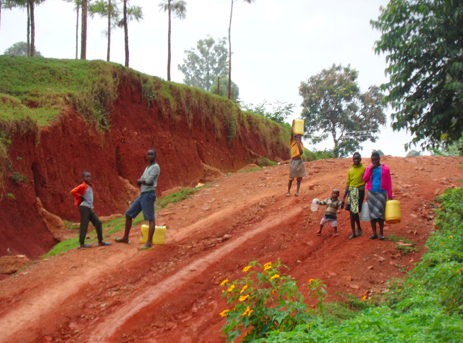In 2005, Dr Robert McDonald, a retired businessman and engineer, began a 'reverse engineering' process with the goal of developing cheap, effective water filtration and disinfection. Dr. McDonald dedicated his time and talents to creating a point of use water purification system that would be simple, require no power, with no moving parts and could be made with local materials and by local people all over the world.
The Aqua Clara Bio-Sand Filter was extensively tested and developed by Dr. McDonald and a team of engineers at Zeeland Water Treatment Plant in Michigan, USA. In 2007, a beta site was established in Eldoret, Kenya and it was confirmed that the output water produced water that was safe for drinking. Following the testing period, ACI secured a patent on the chemical processes utilized in our filters, enabling organizations employing any size filter body to install a filter with the appropriate composition of sand, and gravel.
ACI takes a unique approach to the distribution of its water filter technologies and knowledge. ACI's approach also centers on training and supporting individuals and/or organizations to establish and manage micro enterprises based around purifier construction, sales and service. The program is flexible, and a large number of different structures have been implemented according to local needs and conditions – though the focus is always on local sustainability.
Initial ACI field programs were launched throughout the Americas and Africa. Our first full year of operation was 2008, and water purifiers were successfully placed in eight countries worldwide. In 2009, ACI expanded into more communities in more countries through partnerships with in-country organizations. Our staff, both paid and volunteer, have been involved in continually researching simple and sustainable solutions to worldwide water issues, developing our support materials, hosting training sessions in the US and across the world, and supporting the launch and operation of ACI program sites.
We directly support two “core” sites in Kenya and Nicaragua. These sites serve as proving grounds for new techniques and approaches to addressing clean water and related issues. Once fully evaluated, the lessons learned here are ready to be shared with other sites in other parts of the world.
ACI comprises a small number of highly qualified full-time paid staff who fill a variety of responsibilities in both the adminstration of the organization and in the conduct of its field initiatives. It also relies on an extensive number of professionals from many fields and disciplines who volunteer their services to pursuing the various elements of the ACI mission. This combination of skills and talents serves to move the organization forward, while at the same time ensures that over 85% of organizational revenues are allocated to programs in the field that benefit our target populations.
Our principal sources of revenue are gifts and grants, which we actively seek. Along with these, we receive Carbon Credits through ClimateCare based in Oxford, England. We receive these by closely monitoring our filters throughout Kenya, making sure they continue to function providing sustainable clean water to households.
In 2010 Aqua Clara moved into the MSU Bio-e facility in Holland under the aegis of Dr. Ted Loudon, MSU Emeritus Professor of Biosystems and Agricultural Engineering and a member of our Science and Technology Council. Our location in this exceptional facility has provided access to MSU faculty and research administrators who provide ongoing advice and support for ACI initiatives. It has also generated joint project development and funding activities, with more on the horizon.
In 2010 Dr. McDonald elected to leave the presidency of ACI to focus his time and energies on new technology development. Dr. Harry Knopke, President Emeritus of Aquinas College and CEO of the Safe Water Institute, succeeded Dr. McDonald as President. Together, they have led the ongoing development of Aqua Clara as an organization and have brought to market a range of new technologies aimed at specific water issues and needs found in different countries.


 English
English Spanish
Spanish